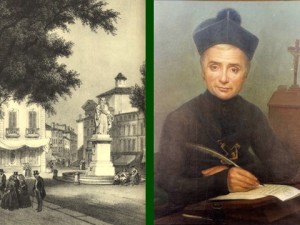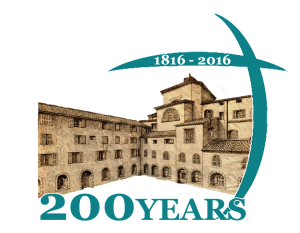Not all approached by Eugene to join him on 25 January 2016 had the same sentiments as Henri Tempier. In this letter to his friend, Forbin Janson, Eugene gives vent to his feelings in a frank, and rather humorous, description of the reactions of some of his future companions.
Despite all this, they did get together and begin, and we are here today because in spite of their human frailties, they did manage to put the founding dream into reality. God certainly does work miracles despite the imperfect vessels we are!
The house was bought a long time ago; the church leased and partly repaired. All is ready on the material side but my men dither, the few that they are.
He on whom I was counting the most is letting himself be deterred by the cackling of the pious hens of his parish. He is convinced there is much good he can do his backyard. He hesitates to leave and I am dismayed by his indecision.
Another who excels constantly in proclaiming the Word of God to the people is only partially attached to our mission, being persuaded that he does enough good by himself on his travels to and fro.
A third, who is too incensed and vexed with the slowness of the others, threatens to take off by himself if they do not promptly make up their minds.
A fourth, who is an angel, and who seems destined to be the joy of a community, cannot obtain permission to leave his vicariate, although he protests that he cannot bear to stay and wants to work only in the mission field, etc.
I myself, overwhelmed with worries and cares, wage war listlessly, supported in the midst of this bother only by the supernatural outlook which inspires me, but which does not prevent me feeling the whole weight of my situation and all the more woefully in that I am helped neither by my taste or inclination which indeed are quite contrary to the kind of life which I am leading. All this God sends my way for my embarking on such a difficult venture.
How can I put up with a priest who pledges himself with words of absolute devotion and then comes to retract them for the reason that his mother, who has lived separately from him for ten years, cannot live without him – he would regard it as homicide were he not to give her the consolation of eating with her – and more twaddle of this sort?
The one who should have rendered us the greatest service went back on his word; he remains in his parish wherein he stirred up such a commotion with his ridiculous farewells and got the people so worked up that they opposed his departure.
Letter to Forbin Janson, 19 December 1815, O.W. VI n. 8
Eventually, the first five responded! Our “founding fathers” are:
Eugene de Mazenod who was 33 years old, and was the one whose vision sparked the new missionary adventure.
The first three of his companions had been seminarians in Aix at the time when Eugene was a part-time spiritual director and confessor there from 1812 onwards:
Auguste Icard was 25-years old, ordained two years before for the Diocese of Aix, and had been assistant priest in the parish of Lambesc, near Aix.
Henri Tempier was 27, and had been a priest for two years, working as assistant priest in Arles.
Sébastien Deblieu was 27, and had had three years of priestly ministry, working as assistant in the parish of St. Jean outside the Walls in Aix, and then for a year as parish priest of Peynier. He came to live in the Carmelite convent a few days after the others.
Emmanuel Maunier was 46, and was a widower who was ordained a priest for 18 years and worked in Marseille. Although he was a founding member and signed the 25 January document, he was only able to move into the community in March.
Pierre Mie was 47, and had been a priest for 18 years, working in various parish situations and also preaching retreats and missions. It appears that he was a part of the Missionaries in their life and activities from the beginning but only definitively went to live in Aix much later.
The older priests, Maunier and Mie, had both experienced being persecuted as priests during the Revolution and, at danger to themselves, had ministered clandestinely to people. Their experiences would have made them very open to Eugene’s understanding of the damage caused to the Church by the Revolution – especially as expressed in the Preface.



“I myself, overwhelmed with worries and cares, wage war listlessly, supported in the midst of this bother only by the supernatural outlook which inspires me, but which does not prevent me feeling the whole weight of my situation and all the more woefully in that I am helped neither by my taste or inclination which indeed are quite contrary to the kind of life which I am leading. All this God sends my way for my embarking on such a difficult venture.” It would seem that ALL of the founding fathers had some difficulties in coming together in Aix to be a part of something much greater than themselves – they were having to leave something behind, including Eugene. He speaks of having to go against his own nature, his own tastes and inclinations. There is a sense of powerlessness with him which he does not deny – in fact he acknowledges it and still continues on the path that he has been inspired to follow.
I think of the countless letters he wrote to his mother to try and persuade her into acknowledging that the worthiness of his becoming a priest and then working with the poor when he could have chosen a much ‘cushier’ posting with the people of Aix, one that was fitting for a man of his background.
There is such a sense of “God” in all of this as I reflect this morning. God has inspired one who is so on-fire that he inspires other to join him. Eugene is not blind at all to his own weaknesses and wounds, nor those of the others and still he loves. He speaks of one who would be the ‘joy’ of the community.
I have been beating myself up a little bit because my wounds do not seem to fully heal, there is a scar there, a part of me. I have not stopped in my tracks because of them, but when they are visible I do slow down, question and struggle to keep moving forward. I seem to be able to identify in some ways with the humanness of those first five.
This morning I am reminded of family birthdays. You know the kind I speak of – where we come to celebrate each other, tell stories about each other that highlight our struggles and foibles, our talents and gifts, our uniqueness and how greatly we are loved. Finally we raise our glasses in a toast and sing happy birthday. It is grand to have a party.
As we prepare for the 25th we are learning, remembering, hearing the stories, allowing them to touch us and become a part of who we are. I am so grateful that God has given me such a life, that he had this planned even before I was. He could have placed me anywhere on this earth, in any time, and yet he chose for me a perfect garden to grown in, he planted me, nourished and protected me, allowed me to grow into a small flower that has a beauty of it’s own. It is a struggle to say those words aloud, but I cannot deny the greatness of God.
Look Eugene – at your sons and daughters, how we have grown over the past 200 years. Thank you for sharing who you were and are as lived in your family today.